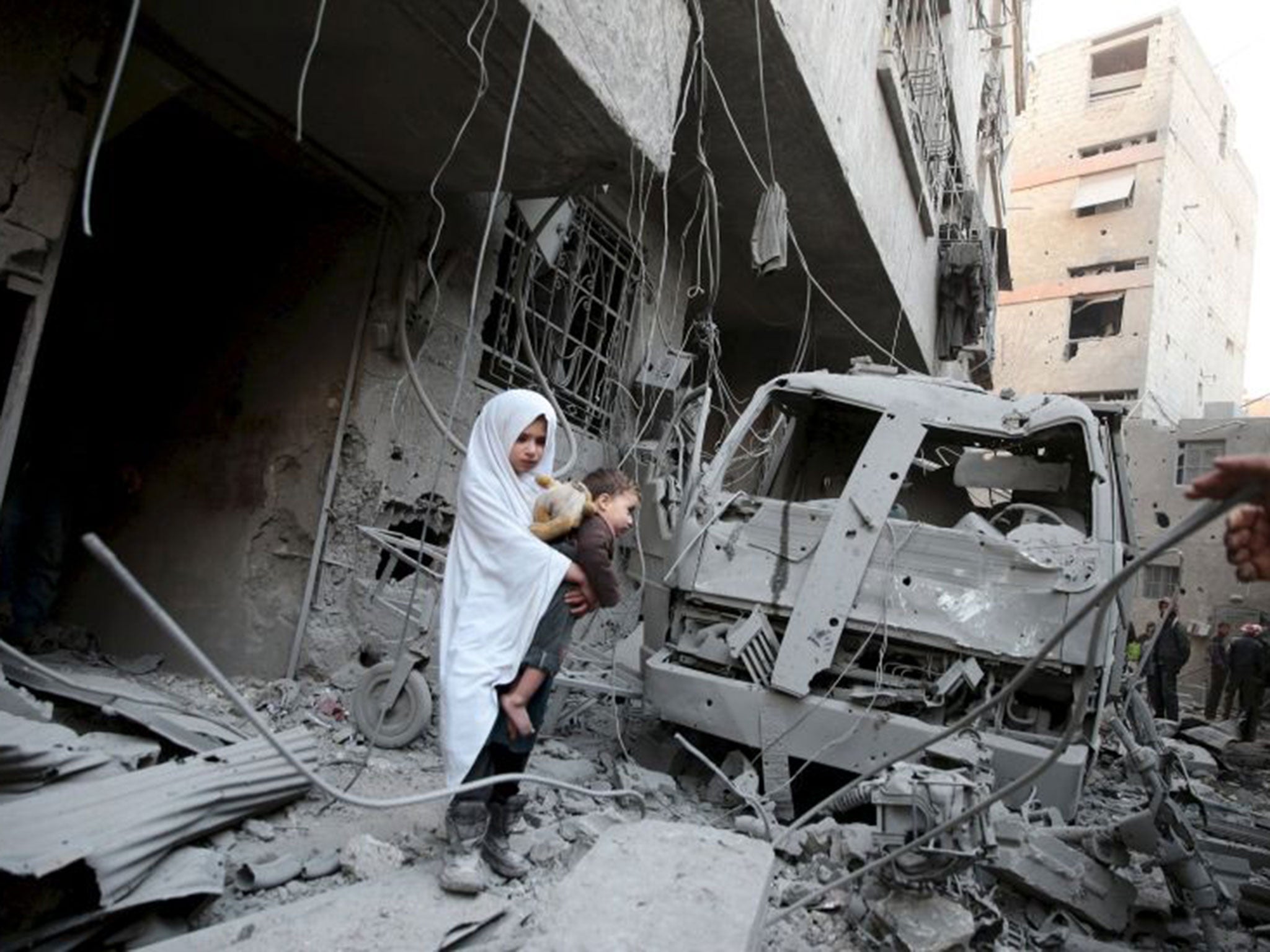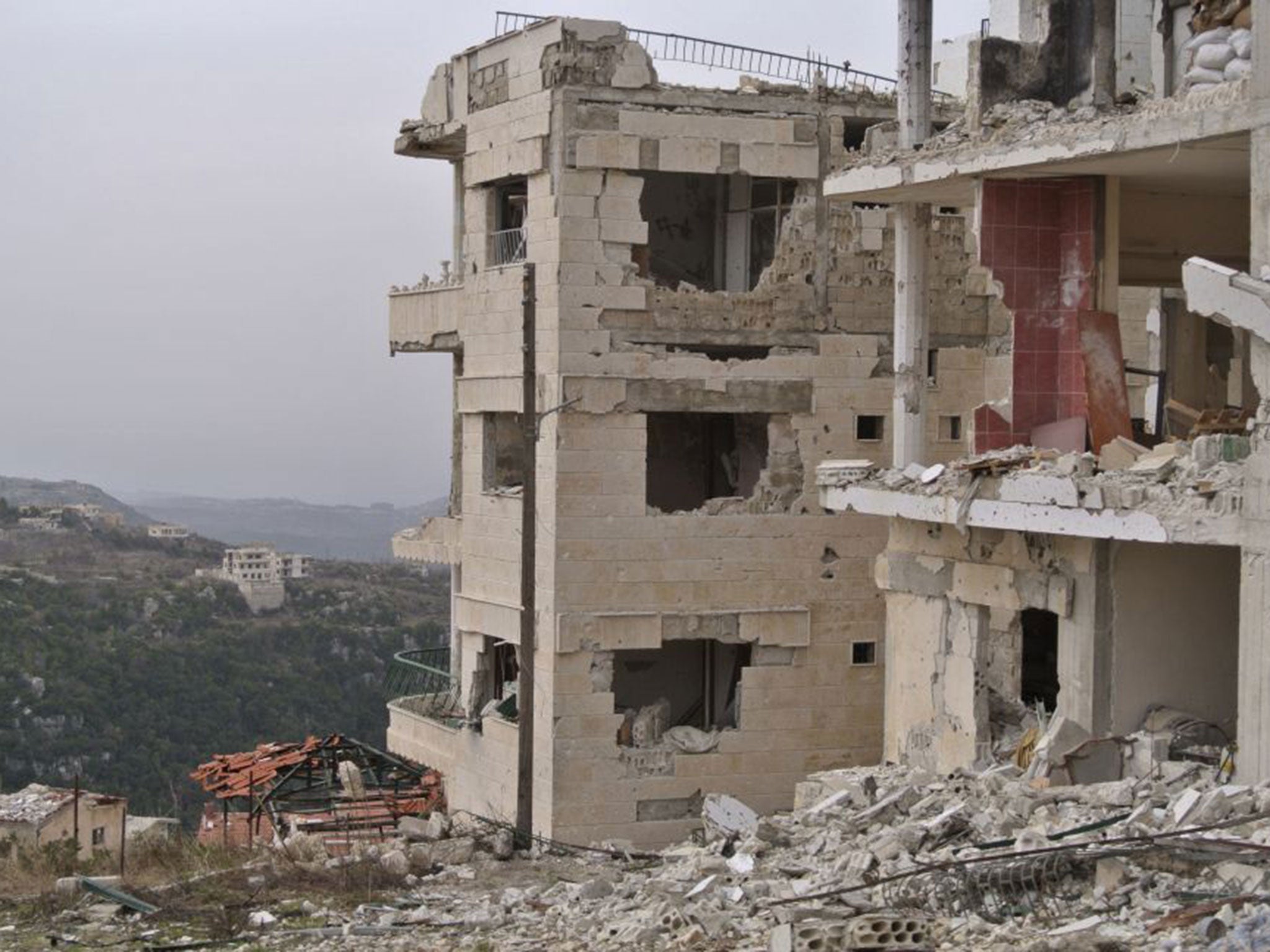Syrian civil war: Why the endless conflict is at a decisive point
Talks in Geneva may produce little of substance, but winners and losers are starting to emerge


Your support helps us to tell the story
From reproductive rights to climate change to Big Tech, The Independent is on the ground when the story is developing. Whether it's investigating the financials of Elon Musk's pro-Trump PAC or producing our latest documentary, 'The A Word', which shines a light on the American women fighting for reproductive rights, we know how important it is to parse out the facts from the messaging.
At such a critical moment in US history, we need reporters on the ground. Your donation allows us to keep sending journalists to speak to both sides of the story.
The Independent is trusted by Americans across the entire political spectrum. And unlike many other quality news outlets, we choose not to lock Americans out of our reporting and analysis with paywalls. We believe quality journalism should be available to everyone, paid for by those who can afford it.
Your support makes all the difference.The Syrian peace talks between government and opposition will begin in the next few days in Geneva in an atmosphere of almost undiluted gloom about the prospects for success. The two sides hate each other and have spent five years trying to kill each other, making it unlikely that they will agree to share power in any way except geographically, with each side keeping the territory it currently holds and defending it with its own armed forces.
This pessimism is difficult to contradict, given that several of the most powerful groups doing the shooting will not be present in Geneva. Neither Isis nor the al-Nusra Front are invited, not that it was ever likely that they would turn up even if they were. There are disputes about who exactly is a terrorist, with Saudi Arabia pushing the Army of Islam that controls the rebel stronghold on the eastern side of Damascus and Turkey insisting on the exclusion of the Syrian Kurds, America’s most effective ally against Isis.
The problem about ending the war in Syria and Iraq is that there is a multitude of players who are too strong to lose but too weak to win. Countries and movements such as Iran and Hezbollah see themselves as fighting for their very existence in a war they cannot afford to lose. Others, like Saudi Arabia and Turkey have invested too much credibility in the struggle for Syria to admit they are not going to achieve their aim of ousting President Bashar al-Assad.
Wars sometimes end by exhaustion rather than agreement, and that may be the best that can be expected for Syria. Local ceasefires and armed truces would be put in place, like the 600 or more that periodically interrupted the 15-year civil war in Lebanon. The difficulty here is that cult-like movements such as Isis and al-Nusra exist to fight for and live up to their Islamic faith by fighting what they see as demonic enemies. They are not like the Lebanese warlords who used to occasionally find it in their mutual interests to stop trying to kill each other.
But, while we may not see many positives emerge from the talks in Geneva, the political landscape in the region is a little more conducive to peace than previously. The Russian military intervention four months ago means that Assad is not going to lose, though he is unlikely to win decisively. He remains in power but only because of the increased support from Iran, Russia and Hezbollah in Lebanon and, even with their backing, his army has not recaptured cities he lost last year, such as Palmyra and Idlib. President Assad may not want to talk in Geneva, or subsequently, but he is more than ever dependent on these external allies who do not want to be mired in an endless Syrian civil war.
Winners and losers are beginning to emerge in Syria, though not all of those involved can see this. Isis is looking increasingly battered by a medley of enemies backed by the US and Russian air forces, though it is nowhere near defeat. The US keeps trumpeting its loss of Ramadi, in Iraq, but the Iraqi special forces that took over the ruined city number only about 500 soldiers. The Iraqi Kurdish peshmerga who recaptured Sinjar have not been paid for five months, because the Kurdistan Regional Government is bankrupt. The Syrian army is short of men and, while its morale may be higher thanks to the Russians, it is still exhausted by five years of war. The Syrian Kurds are successful, but averse to being used as cannon fodder by the US and they are nervous of Turkish intervention.
It is dangerous to describe any single phase of a long-running civil war as being decisive, but the coming months could be just that. The US and its allies in Syria, primarily the 25,000 fighters of the Kurdish People’s Protection Units (YPG) with some Sunni Arab allies, are eager to cut Isis off from its last link, through Turkey, to the outside world. They are not far from achieving this. Arab units of the Syrian Democratic Forces (SDF), an umbrella organisation dominated by the YPG, captured the Tishrin dam on the Euphrates, 55 miles east of Aleppo, on 23 December and are close to the Isis stronghold of Manbij.

The news that a movement few had heard of is threatening an obscure town in Syria was never going to set the world on fire. But it is important for three reasons: first, Isis is now almost sealed off within its self-declared caliphate; second, the Syrian Kurds, using their surrogate, the SDF, have crossed west of the Euphrates despite Turkey’s threats never to let this happen without a military response; third, and most important, the attack of the SDF was supported by both US and Russian air strikes, though not at the same time. “The Russians are now carrying out most of the air strikes there,” said a Syrian Kurdish representative. In other words, the US and Russia in this part of Syria are acting as if they had a de facto military alliance.
The big loser here could be Turkey, which seemed to be in such a strong position to extend its influence across the Middle East in 2011. Its image as an economically prospering, democratic yet Islamic, state was attractive to many Arab protesters looking to overthrow and replace dictatorial rule. But the Turkish President, Recep Tayyip Erdogan, soon made clear that he was supporting a Sunni Arab sectarian takeover that was anti-Shia, anti-Kurd and anti-secular and was bound to be resisted. Having first backed the Muslim Brotherhood, Turkey then tolerated or helped Isis, al-Nusra and extreme jihadi groups.
It was a calamitous miscalculation for Syria and for Turkey. For all President Erdogan’s neo-Ottoman dreams of making Turkey a great power in the Middle East again, he has achieved the opposite. How he responds to this failure should become clear in the coming months as the US and Russia try, in different ways, and in support of a rather different list of allies, to close the border between northern Syria and Turkey.
President Erdogan will either have to accept Turkey’s exclusion from northern Syria or increase Turkish military involvement, possibly including an invasion. Critical commentators in Turkey say he wanted to invade last year, but was restrained by senior Turkish army generals. Full-scale military engagement by Turkey would be more difficult today, since Russian military intervention and the shooting down of a Russian bomber by a Turkish F-16 on 24 November. A Turkish move into northern Syria now would face American disapproval and resistance by Russian aircraft and anti-aircraft missiles.
The war in Syria and Iraq is far from over but, as winners and losers emerge, the chances of local ceasefires and, ultimately, some sort of peace will become more feasible. The Assad government and the opposition may not be able to agree in Geneva, but the outside powers which support them are becoming increasingly eager to bring the conflict to an end.
Join our commenting forum
Join thought-provoking conversations, follow other Independent readers and see their replies
Comments